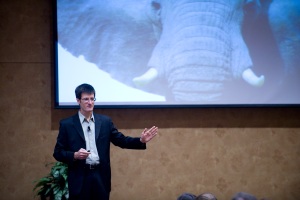 A few weeks ago I had the privilege of sitting in on a member-initiated briefing on youth mentoring, co-sponsored by the Travelers Foundation and the Carlson Family Foundation.
A few weeks ago I had the privilege of sitting in on a member-initiated briefing on youth mentoring, co-sponsored by the Travelers Foundation and the Carlson Family Foundation.
Coming into the program, I already solidly believed in the importance of the subject matter, as I can recall more occasions than I can count on two hands when a teacher or tutor has made the difference between passing and failing. Even now, in my college years, I am extremely grateful to have math tutors available to help me get through my microeconomics and finance classes. For me, the one-on-one encouragement, attention and accountability remain crucial.
So how do we pinpoint what makes a mentorship experience effective?
The resounding reason for attending the program given by most of the grantmakers was the desire to learn more about a new online program assessment tool called the Quality Mentoring Assessment Path, or QMAP. QMAP is presented by the Mentoring Partnership of Minnesota (MPM) and based on the latest policies, practices, experience and research for youth mentoring.
During the program, grantmakers were shown a video demonstration of how QMAP works, along with next steps available after an assessment is completed. One of these steps includes a follow-up visit from an MPM staff member to help design an individualized improvement program and provide additional resources.
These steps help answer the big question provoked by undergoing the QMAP assessment: “Based on results, what is the plan for improvement of your mentoring program?”
Why Assessment Is So Important
As powerfully put by Saint Paul Public School Foundation’s Karen Woodward, “Literacy is life or death.”
In today’s competitive age of information and technology, in order for kids to have the best chance at success, tutoring and mentoring have proven time and again to be key components. Involvement in these helps students socially, emotionally, psychologically, as well as academically. The research has shown it, youth can attest to it.
So, why the big push for quality now? Laura LaCroix-Dalluhn from Youth Community Connections explained: “Just bringing kids together and giving them a safe place to study is not enough.” Not all tutoring and mentoring experiences are created equal and can actually do more harm than good if they are not of quality. But different ideas of what constitutes “quality” pose a challenge, which is where the QMAP assessment system comes into play. The initiative to shift the field to more accountable quality using tools such as QMAP is meeting a serious need.
Use of the QMAP system may further inspire both volunteers and grantmakers to invest their support in programs they know are dedicated to a higher quality standard.
Graham Hartley of MIGIZI Communications elaborated on a metaphor Woodward used during the discussion to explain that high quality will have several looks:
“It’s a fruit salad of organizations, not a fruit smoothie. Programs participating in the QMAP process do not lose their individual flavor.”
In other words, each program that actively participates in the QMAP process will not lose its uniqueness and become a cookie cutter version of every other program, but rather enhance its way of practice, so that parents and students can depend on its quality.



 Posted by McKenzie Mackintosh
Posted by McKenzie Mackintosh 




